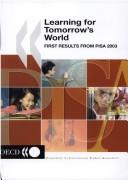| Listing 1 - 5 of 5 |
Sort by
|
Book
ISBN: 2856340741 Year: 2004 Publisher: Dijon : Université de Bourgogne, Institut de Recherche sur l'Education,
Abstract | Keywords | Export | Availability | Bookmark
 Loading...
Loading...Choose an application
- Reference Manager
- EndNote
- RefWorks (Direct export to RefWorks)
Évaluation --- Réussite scolaire --- Ecole -- attitude envers --- Eleve --- Eleve -- comportement --- Facteur socio-culturel --- Ecole -- attitude envers --- Eleve --- Eleve -- comportement --- Facteur socio-culturel
Dissertation
Year: 2004 Publisher: Liège : Université de Liège, Faculté de psychologie et des sciences de l'éducation (ULg),
Abstract | Keywords | Export | Availability | Bookmark
 Loading...
Loading...Choose an application
- Reference Manager
- EndNote
- RefWorks (Direct export to RefWorks)
Pour répondre la question, nous nous sommes basés sur la théorie et les recherches de Diana Baumrind afin de formuler notre hypothèse qui fait, par ailleurs, plus référence à la perception de l'éducation reçue et ce, pour des raisons déontologiques. Nous avons procédé par des analyses de cas en utilisant un entretien diagnostique (MINI), un entretien semi-structuré et le Parental Behavior Questionnaire - Head Start (PBQ-HS) administrés à des usagers de drogues dépendants et à des sujets contrôles. Au terme de cette recherche, nous n'avons pu établir aucun lien entre la perception de l'éducation reçue et la dépendance aux drogues ilicites.
INSERTION SOCIALE --- FAMILLE --- PRATIQUE EDUCATIVE --- RELATION PARENTS-ENFANT --- PERMISSIVITE --- RELATION FAMILIALE --- AUTORITE --- TOXICOMANIE --- FACTEUR SOCIO-CULTUREL --- INSERTION SOCIALE --- FAMILLE --- PRATIQUE EDUCATIVE --- RELATION PARENTS-ENFANT --- PERMISSIVITE --- RELATION FAMILIALE --- AUTORITE --- TOXICOMANIE --- FACTEUR SOCIO-CULTUREL
Book
Year: 2004 Publisher: Paris : OCDE (Organisation de coopération et de développement économiques) = OECD (Organisation for Economic Co-operation and Development),
Abstract | Keywords | Export | Availability | Bookmark
 Loading...
Loading...Choose an application
- Reference Manager
- EndNote
- RefWorks (Direct export to RefWorks)
EVALUATION SCOLAIRE --- COMPETENCE --- SOCLE DE COMPETENCES --- MATHEMATIQUES --- APPRENTISSAGE --- ELEVE -- COMPORTEMENT --- ETUDES -- MOTIVATION --- LECTURE --- ENSEIGNEMENT DES SCIENCES --- STATUT SOCIO-ECONOMIQUE --- FACTEUR SOCIO-CULTUREL --- EVALUATION SCOLAIRE --- COMPETENCE --- SOCLE DE COMPETENCES --- MATHEMATIQUES --- APPRENTISSAGE --- ELEVE -- COMPORTEMENT --- ETUDES -- MOTIVATION --- LECTURE --- ENSEIGNEMENT DES SCIENCES --- STATUT SOCIO-ECONOMIQUE --- FACTEUR SOCIO-CULTUREL
Dissertation
Year: 2004 Publisher: Liège : Université de Liège, Faculté de psychologie et des sciences de l'éducation (ULg),
Abstract | Keywords | Export | Availability | Bookmark
 Loading...
Loading...Choose an application
- Reference Manager
- EndNote
- RefWorks (Direct export to RefWorks)
DIFFERENCE CULTURELLE --- CULTURE --- COUPLE --- FAMILLE --- RELATION INTERGENERATIONNELLE --- Systèmes, Analyse de --- EVALUATION DU SYSTEME FAMILIAL --- AMBIANCE --- ETHIQUE --- MYTHE --- IDENTITE SOCIALE --- FACTEUR SOCIO-CULTUREL --- DIFFERENCE CULTURELLE --- CULTURE --- COUPLE --- FAMILLE --- RELATION INTERGENERATIONNELLE --- Systèmes, Analyse de --- EVALUATION DU SYSTEME FAMILIAL --- AMBIANCE --- ETHIQUE --- MYTHE --- IDENTITE SOCIALE --- FACTEUR SOCIO-CULTUREL

ISBN: 9264007245 9789264006416 9789264007246 9264006419 Year: 2004 Publisher: Paris OECD
Abstract | Keywords | Export | Availability | Bookmark
 Loading...
Loading...Choose an application
- Reference Manager
- EndNote
- RefWorks (Direct export to RefWorks)
This report presents the first internationally comparable results to OECD's 2003 Programme for International Student Assessment (PISA) Survey of the educational performance of 15-year-olds in reading, mathematics, and science in 25 OECD countries. This year, the concentration was on mathematics. Beyond the examination of the relative standing of countries in mathematics, science and reading, the report also looks at a wider range of educational outcomes that include students’ motivation to learn, their beliefs about themselves, and their learning strategies. Furthermore, it examines how performance varies between the genders and between socio-economic groups; and it provides insights into some of the factors that influence the development of knowledge and skills at home and at school, how these factors interact and what the implications are for policy development. Most importantly, the report sheds light on countries that succeed in achieving high performance standards while, at the same time, providing an equitable distribution of learning opportunities. The report presents a wealth of indicators showing how countries compare in various measures of educational performance and factors that affect that performance.
Didactic evaluation --- Academic achievement --- Education and state --- Mathematical ability --- Problem solving --- Reading --- Science --- OESO / OCDE / OECD 339.92OECD --- Onderwijs 37 --- 51 --- Literacy testing --- Mathematics --- Education --- Education policy --- Educational policy --- State and education --- Social policy --- Endowment of research --- Academic underachievement --- Achievement, Academic --- Educational achievement --- Scholastic achievement --- Scholastic success --- School achievement --- Student achievement --- Underachievement, Academic --- Performance --- Success --- 51 Mathematics --- Testing --- Ability testing --- Government policy --- Material de apoyo Educación contínua. --- Educación contínua --- Materiales de apoyo Educación contínua --- Academic achievement. --- Education and state. --- Estratégias de aprendizaje. --- Testing. --- Ability testing. --- Academic performance --- Academic progress --- Academic success --- Achievement, Scholastic --- Achievement, Student --- Performance, Academic --- Progress, Academic --- School success (Academic achievement) --- Success, Academic --- Success, School (Academic achievement) --- Success, Scholastic --- 51 Wiskunde. Mathematiek --- Wiskunde. Mathematiek --- Lecture --- Mathématiques --- Eleve -- comportement --- Eleve -- participation --- Enseignement des sciences --- Evaluation scolaire --- Facteur socio-culturel --- Statut socio-economique
| Listing 1 - 5 of 5 |
Sort by
|

 Search
Search Feedback
Feedback About UniCat
About UniCat  Help
Help News
News